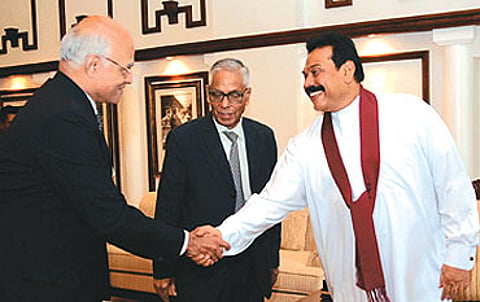I
t wasn't quite the ceasefire the Liberation Tigers of Tamil Eelam (LTTE) or its supporters were hoping for. On Monday, April 27, the Sri Lankan government announced it was ending its combat operations against the Tigers. Decoded, it meant the Lankan troops would not employ heavy-calibre guns and bombers as they circled in on the tiny patch of northern coast the LTTE cadres were bottled in. Sri Lankan President Mahinda Rajapakse's office clarified that the troops would now be engaged in rescuing and saving the 20,000-odd Tamil civilians living in the the LTTE-held territory, shrinking rapidly with every passing day and measuring just 6 sq km at the time of writing.Scepticism about Rajapakse's commitment apart, few disagree that he made the announcement because of the mounting international pressure and neighbour India's direct intervention in the impending human crisis. Heavy weaponry in the final assault, it was pointed out, could lead to a veritable massacre—unacceptable to India, both because of the sheer inhumanity of it and, no doubt, considering the electoral implications. It prompted Prime Minister Manmohan Singh to despatch, on April 24, national security advisor M.K. Narayanan and foreign secretary Shiv Shankar Menon to hold talks with Rajapakse in Colombo. Sources privy to this meeting say the Indians made it amply clear to Rajapakse that rising civilian casualties were "totally not acceptable".
The April 27 announcement, thus, got Indian officials expressing some satisfaction. "We have managed to get more than a pause in the ongoing war," a senior Indian diplomat said. Officials say no strong-arm tactics were employed to persuade Rajapakse to end the combat operations. Instead, they pointed out to him that a delay of a few days in achieving complete victory over the LTTE could help save thousands. Basically, an unconscionable death toll would have lost Colombo the world's tacit approval for the war.
In Colombo, though, the meeting was perceived as yet another attempt by India to force a truce between the army and the Tigers. This sentiment was portrayed best in a weekend newspaper headline—'India Trips Lanka at Winning Post'. Rajapakse's brother and defence secretary Gotabaya dismissed such speculation with his usual bluster: "That (ceasefire) is a joke. What's the need for a ceasefire when they (LTTE) are running away?"
It has taken the Sri Lankan government months to accept the necessity of saving civilians. Foreign minister Pranab Mukherjee had harped on this aspect on his visit to the island two months ago. An estimated 6,500 civilians have died since January, a figure perhaps on the lower side considering Colombo's refusal to allow most independent observers into the battle-ravaged zones.
So what then prompted a pricking of Colombo's conscience, particularly as Indian officials refrained from tough talk during parleys with the president? In diplomacy, it's said, what is left unsaid has as much significance as what is spelt out. Colombo realised a battlefield bloodbath could have a severe impact in Tamil Nadu, which goes to elections on May 13. To limit the damage to the UPA alliance, would Delhi become adventurous? Worrying signals had already started emanating from Tamil Nadu. Apart from chief minister M. Karunanidhi, who has never shied away from paying lip service to the Tamil Eelam cause, his bete noire, J. Jayalalitha, had in a remarkable turnaround became shrill in her opposition to the Lankan military operation.
The DMK's increasing restlessness saw Congress president Sonia Gandhi calling off an election campaign rally in Bihar's Samastipur and convening a brainstorming session of senior party leaders in Delhi on April 23. At the meeting, chaired by Prime Minister Manmohan Singh, it was decided that a statement would be issued calling for all steps to ensure the safety of innocent Tamilians caught in the war zone in Sri Lanka; and also to send Narayanan and Menon to Colombo. "We have always told the Sri Lankan government that there's a certain threshold about the plight of the Tamil civilians that should never be crossed," says a senior foreign ministry official. He claims the fast-paced developments in the island were threatening to "cross that threshold".
